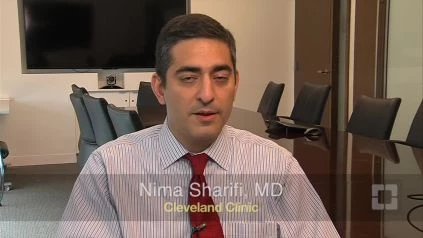Dr. Nima Sharifi, MD gives his expert opinion on a collaborative Cleveland Clinic-Mayo Clinic team of researchers that has shown for the first time that patients with advanced prostate cancer are more likely to die earlier from their disease if they carry a specific testosterone-related genetic abnormality.
The findings, published in the September 2016 edition of The Lancet Oncology, suggest that a specific, inherited polymorphism, or inherited genetic change, in the HSD3B1 gene renders standard therapy for metastatic prostate cancer less effective. The researchers anticipate that the findings will lead to a simple blood test to detect the presence of the polymorphism, personalizing cancer treatment and indicating which patients may need more aggressive treatment.
The team, led by Cleveland Clinics Nima Sharifi, M.D., studied three groups of men at Cleveland Clinic and Mayo Clinic who were treated with androgen deprivation therapy (ADT, also known as medical castration), the standard of care for treatment of metastatic prostate cancer.
Because prostate cancer cells use male androgens for fuel, ADT is used to starve the tumor of its energy supply. While the treatment is widely successful in many patients, eventually prostate tumors are able to circumvent ADT, and patients become resistant to the treatment because the tumors make their own androgens. In 2013, Dr. Sharifi discovered that this resistance is caused by a single nucleotide polymorphism (SNP) in the HSD3B1 gene, which encodes an enzyme that is crucial to the androgen synthesis process. The altered enzyme enables prostate cancer cells to generate more of their own androgens when treated with ADT, enhancing the cancers ability to flourish and spread.
In the current study, Dr. Sharifi and colleagues sequenced the HSD3B1 gene in 443 men in three different cohorts who had undergone ADT and recorded their outcomes. They found a strong correlation between the presence of the SNP HSD3B1 (1245C) and poorer survival (progression-free, distant metastasis-free, and overall survival). In addition, they found that patients who had inherited two copies of the gene with the polymorphism (homozygotes) fared much worse than those who had only inherited one allele (heterozygotes), suggesting that the extra copy of the polymorphism leads to increased rogue androgen synthesis.
These results confirm the researchers previous mechanistic findings about HSD3B1 (1245C) and suggest that the polymorphism is a strong predictor of which patients will develop resistance to ADT.
A simple blood test could allow us to personalize therapy by telling us which patients need to be treated more aggressively, such as with more intensive hormonal therapy, said Dr. Sharifi. On the contrary, patients with metastatic cancer who do not carry the polymorphism may fare better with ADT alone. Dr. Sharifi is on the medical staff in Cleveland Clinics Lerner Research Institute Department of Cancer Biology, Glickman Urological & Kidney Institute, and Taussig Cancer Institute. He also holds the Kendrick Family Endowed Chair for Prostate Cancer Research.
We are in the early stages of a clinical trial here at Cleveland Clinic that will test alternative treatments for prostate cancer patients who have inherited HSD3B1 (1245C), said Eric Klein, M.D., co-author, chair of Cleveland Clinics Glickman Urological & Kidney Institute, and holder of the Andrew C. Novick, M.D., Distinguished Chair in Urology.
According to the American Cancer Society, prostate cancer is the second leading cause of death in men in the United States, killing one out of every 39 American men.
This work was supported by Cleveland Clinic, the U.S. Department of Defense Congressionally Directed Medical Research Programs, the Prostate Specialized Program of Research Excellence, the Gail and Joseph Gassner Development Funds, a Howard Hughes Medical Institute Physician-Scientist Early Career Award, the Prostate Cancer Foundation, an American Cancer Society Research Scholar Award, and additional grants from the National Cancer Institute (R01CA172382, R01CA190289, and R01CA168899).

